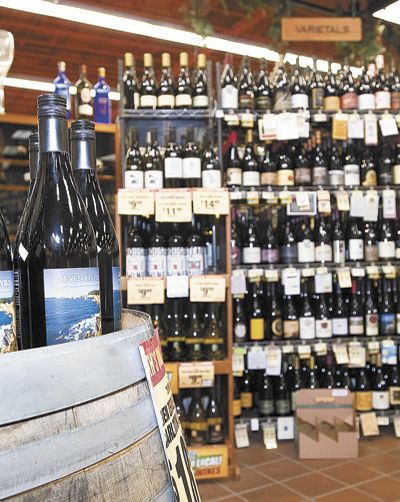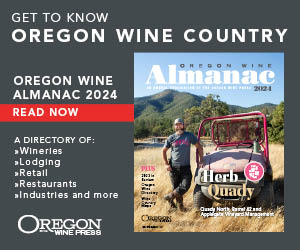All About Margin

By Karl Klooster
Oregon’s been a control state ever since the end of Prohibition. That means the state operates the purchasing, importation, warehousing, distribution, pricing and sale of all distilled spirits.
It does, however, allow properly licensed private companies to deal in wine and beer. One group of licensed wholesalers handle sale and distribution to another set of on- and off-premise licensees that serve consumers.
For wine and beer, transactions among wholesale and retail licensees and end-users is on a cash-only basis. No exceptions, no problem with delinquencies or need for collection activities.
Only 18 states adopted this model, or variations on it, after the ill-fated social experiment in zero-tolerance for alcohol of any kind was brought to an ignoble end in 1934 by the 21st amendment to the U.S. Constitution.
The remainder opted to be open states where all aspects of alcohol distribution and marketing are left to private enterprise. The state’s function is to approve licensees, keep them honest, particularly in regard to underage drinking, and, oh yes, to collect taxes.
But that all appears to be on the verge of change in Oregon, perhaps sooner than we think. The reason is the process is about to accelerate owing to the fact that our neighbor to the north, Washington state, has tromped on the gas pedal.
Beginning June 1, 2012, Washington will become an open state, and the role of the Washington State Liquor Control Board will be strictly as a regulatory agency, much the way the Department of Alcoholic Beverage Control functions in California.
The most significant difference is that, in California, the key criterion to qualify for issuance of a new retail package store license — beyond good character and financial resources — is determined by density of population within a geographic area.
So much so, in fact, that buying and selling off-sale licenses is big business in California. In some parts of the states, the license, itself, may be as highly valued a business asset as real property and revenues.
In Washington, however, it’s all new ground, so the state legislature has set a minimum standard based on size. Unless your store occupies at least 10,000 square feet of retail selling space, you don’t qualify. Period.
How much lobbying influence the so-called “big boxes” had in getting this requirement written into the legislation isn’t clear, but the reality is that we’re talking about having to be, at the very least, a large grocery store. No mom-and-pops need apply.
Whichever major supermarket chains want to be players in this new game obviously won’t have any problem meeting the size requirement. Nor will the likes of Costco, WinCo, Walmart, K-Mart or Bi-Mart, for that matter
However, the impact this new arrangement has on the dynamics of the marketplace remains to be seen. One thing seems certain. A whole lot of Portlanders are going to be crossing the Columbia River bridges in search of better booze buys.
And that’s part of what Oregonians with the power to bring about changes in the Oregon Liquor Control Commission monopoly will be carefully observing and evaluating once the totally revamped Washington system gets under way.
Most everyone with a stake in distilled spirits seems to be of the opinion that some modification of Oregon’s current approach will ultimately take place. But exactly in what form is very much open to conjecture.
The bottom line for state government is retaining a healthy chunk of the $440 million in annual sales generated by approximately 250 contractor-operated retail outlets across Oregon.
The net revenue, which for the 2010–2011 fiscal year amounted to $178.3 million, is allocated among the general fund, city and county governments, mental health, alcoholism and drug services, and a diminutive $300,000 to the Oregon Wine Board.
Retail store operators do not own the merchandise, but rather sell the products and send the revenue to the OLCC, which then compensates them with a percentage of their sales.
If Oregon were to follow Washington, the contracted outlets would all be closed and the OLCC would go out of the liquor warehousing and distribution business. Their regulation responsibilities, on the other hand, would increase considerably.
Only wholesalers with deep pockets and rock-solid records would be considered to take over that function. No more than a couple Oregon-owned companies possess those kinds of credentials, most prominently Maletis Beverage of Portland.
The two giants of the industry, Southern Wine & Spirits and Young’s Market Company, have already positioned themselves as distilled spirits brokers in both Oregon and Washington.
Although a Washington State Liquor Control Board spokesperson said they are still considering distributor applications, it appears that both these companies will be awarded large slices of the market.
A similar scenario would seem likely if Oregon were to relinquish its role as the state’s key player in distilled spirits. Furthermore, if our legislature decided to go the “big box” route in setting retailer criteria, most of the state’s wine merchants would be automatically excluded.
In effect, that would mean some of the finest retail operations staffed by the most knowledgeable personnel would be legally prohibited from offering distilled spirits to their customers, whereas the Safeway down the street could.
But what if Oregon adopted a more open approach similar to that which has operated smoothly in California for decades? How many wine merchants would be interested in jumping on the distilled spirits bandwagon?
Discussions with several retailers elicited as many answers as there were individual situations. But what matters most to them is an even playing field for everyone involved and a fair profit margin. In other words, if you can’t make any money from it, why bother?
John’s Market in Multnomah Village is one of the very few wine merchants in the state that might actually qualify under the Washington directive.
Owner David Percival said, “With our deli section, I think we hit the 10,000-square-foot mark. But, I’d have to take out the tape measure just to make sure.”
Percival acknowledged that if Oregon opened up liquor retailing to the private sector, he’d probably have to get into it just to remain competitive. “Besides,” he said, “We would offer specialty items that Costco probably wouldn’t.”
He was referring to such fine spirits as Cognacs, Armagnacs, single-malt Scotch, gourmet liqueurs and aperitifs, eau de vies and other artisan distillates prized by appreciators whose taste preferences tend toward connoisseurship.
What really concerns Percival, however, is the impact such a change in the way of doing business would have on the little guy. We’d be O.K., either way,” he said. “But I think small, independent stores would suffer if they weren’t allowed to carry liquor.”
At Sundance Cellars in Eugene, owner Gavin McComas could also qualify under the Washington standard owing to the combined wine and food store footage of his adjacent retail businesses. But, he’s not interested.
Stating that no one has presented him with convincing arguments to the contrary, he said. “As far as I’m concerned, we should continue the current system and keep hard liquor out of grocery stores.”
At Oregon’s longest established retail wine store, Ashland Wine Cellar owner Lorn Razzano said, “I wouldn’t carry distilled spirits because of the low profit margins, but here in Southern Oregon, there’s another reason not to do it.”
“Have you ever noticed the liquor store in Hilt, just as you cross the border into California?” he queried. “It’s one of the largest grossing retailers in the entire state.
“Neighbors up here get together and pool their money. Then one of them with a big truck or suburban goes down and buys thousands of dollars worth of booze. During the holidays, the California Highway Patrol has to divert traffic because of the backup.”
However, one of Portland’s premier wine retailers, Liner and Elsen, would probably go with the flow if given the chance. “The playing field would have to be level for everyone,” owner Bob Scherb said. “If the margins were acceptable, I think we’d get into spirits.”
Different views from different viewpoints. But they all concur that at least some, if not all, of Oregon’s current liquor system will eventually change. Whichever way it goes, it will still be far better than bootleg booze, bathtub gin and basement wine barrels.








